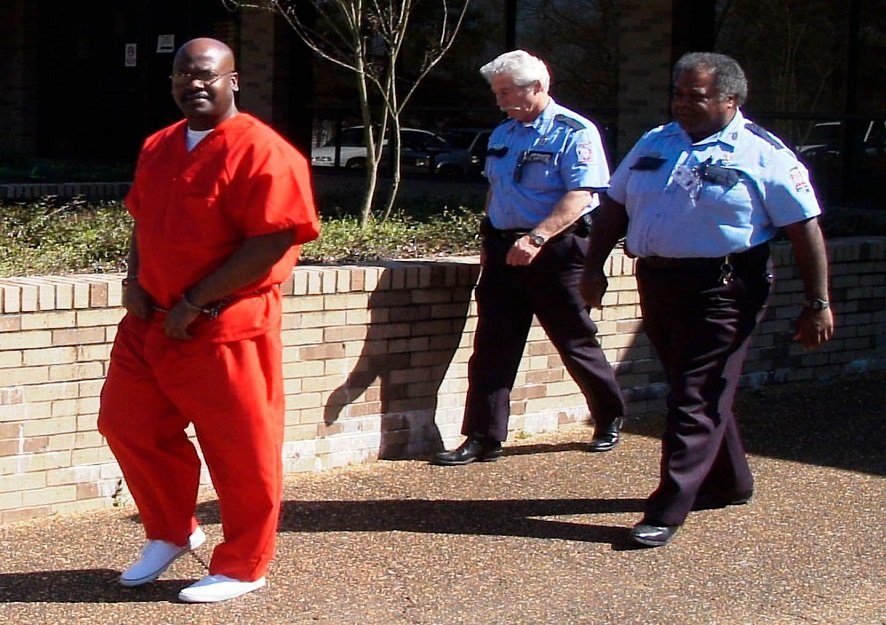The arrest and jailing, as well as, the Supreme Court’s intervention regarding Curtis Flowers can be overwhelming and downright infuriating.
Flowers, 49, was sentenced for quadruple murders, despite maintaining his innocence.
He had been in jail for more than 20 years having been arrested in 1996 after four people were found shot to death in a furniture store in Winona, Mississippi.
The murdered on July 16, 1996 included store owner Bertha Tardy, 59, deliveryman Robert Golden, 42, part-time employee Derrick Stewart, 16, and bookkeeper Carmen Rigby, 45.
Despite Flowers having no prior criminal record and evidence being circumstantial, district attorney Doug Evans, who also served as the prosecutor pinned the murders on him.
However, Flowers exited jail on Monday – 23 years, since his incarceration. He gained temporary freedom when a Mississippi judge allowed him to leave jail to await a possible seventh trial if he could post a bond of $25,000.
The judge condemned District Attorney Doug Evans’ recent handling of the Flowers case, noting the state had not proven enough grounds to keep Mr. Flowers behind bars.
Flowers has endured six trials and four death sentences, despite his latest conviction and death sentence being overturned by the U.S. Supreme Court in June, although the grand jury’s indictment charging him with four counts of capital murder remains in place.

In late September, Flowers was transferred off death row. Since then, he’d been held in a county jail to await a possible seventh trial.
When Flowers walked out of Winston-Choctaw County Regional Correctional Facility on Monday, his two sisters — Priscilla Ward and Charita Baskin welcomed him.
“I feel good right now. I’m happy,” he told reporters before heading toward a car adding, “I’m so excited right now. I can’t even think straight.”
Flowers has never before been granted bail. In capital cases, it’s rarely offered. But Mississippi judges can grant it in instances where there isn’t strong evidence of a defendant’s guilt. Indeed, Circuit Judge Joey Loper’s ruling read like a referendum on the diminished state of the case against Flowers.
The judge ticked through the names of several key prosecution witnesses who have recanted since Flowers was tried in 2010, a trial that Loper presided over. And the judge acknowledged that “possible exculpatory evidence” has surfaced, including findings by the APM Reports podcast In the Dark, which point to Willie James Hemphill as a possible alternate suspect.
“The state has failed to convince this court that the proof of Mr. Flowers’ guilt is evident or the presumption great so as to deny bail,” Loper said, before setting the bail amount at $250,000, of which Flowers had to pay 10 percent.
Flowers has his attorney Rob McDuff to thank for his tenacious fight to have him released from jail and charges dropped. He argued Odell Hallmon who claimed that Mr. Flowers gave him a jailhouse confession has recanted his claim. He also argued for the application of an obscure Mississippi law that requires bail be granted in cases in which a defendant had two trials on a capital indictment end in hung juries, as Flowers has. McDuff also pointed out that Flowers has no prior criminal record and correction officers have called Flowers a model prisoner.

And on Monday morning, a prosecutor from Evans’ office, Adam Hopper, offered only a brief rebuttal to McDuff’s arguments. “Cases are tried in a court of law, not in the media,” in an attempt to direct the judge’s attention away from recent findings calling Flowers’ guilt into question. “You heard the testimony in the prior trials … that Mr. Flowers was the only suspect.”
At this point Judge Loper cut Hopper off.
“Well, I’ve heard that. But yet, after the fact, now I’m hearing that somebody else [Hemphill] was picked up and held for a number of days that was, in fact, a suspect,” Loper said. “How does the state reconcile that?”
“Mr. Hopper, your boss chose, for whatever reason, (chose) not to be here today. I don’t know why he’s not here. I expected him to be here. Nonetheless, he is not. So, I expect you to convey the message to him that this court expects prompt action from that office on all matters that are ordered,” Loper said.

Doug Evans was recently re-elected district attorney for the state’s Fifth Circuit Court District. He ran unopposed.
“Evans, whose misconduct resulted in the reversal of four of Flowers’ convictions and a stern rebuke from the Supreme Court this summer, was sued by the NAACP last month in federal court over his office’s practice of striking black prospective jurors at nearly 4.5 times the rate of white ones.”
After appearing in court, Flowers was taken back to jail. Within hours, he posted the $25,000 necessary to secure his bond. The funds were donated by a supporter in the New York City area.
Flowers’ location will be tracked by ankle monitor. He won’t be allowed to leave home other than to attend a court date or a doctor’s appointment.

His lawyer has filed two other motions — one seeking dismissal of the charges against Flowers and the other asking for the removal of Evans from the case. The long-time district attorney hasn’t yet responded to either, and the case may still head to an unprecedented seventh trial.
Flowers was a worker at the store the murders took place and had been fired weeks prior to the murders by the owner. His pay was withheld to cover the cost of merchandise he supposedly damaged, an employee told prosecutors. Curiously, nearly $300 was detected missing after the killings.
It didn’t matter that the gun used in the incident could not be independently ascertained.
Flowers was found guilty in his first three trials – the first one with an all-white jury and the next two with just one black juror. The fourth and fifth trials ended in mistrials.









